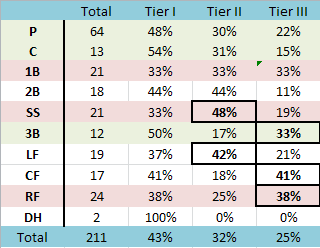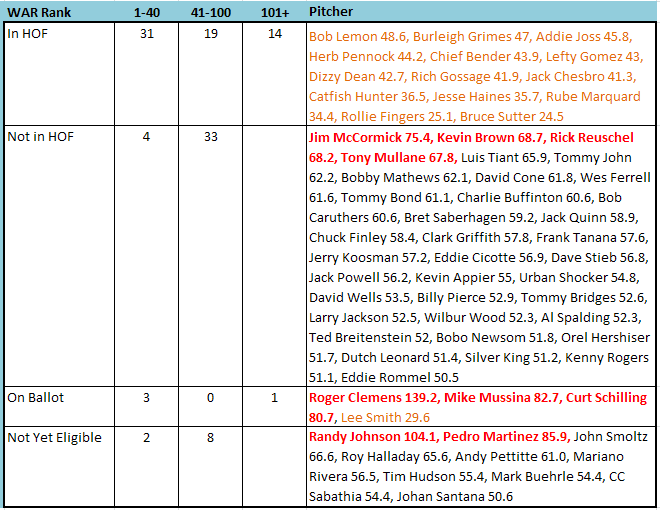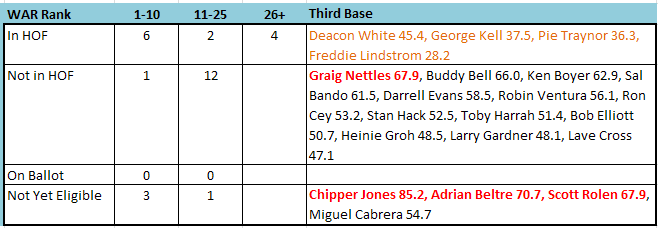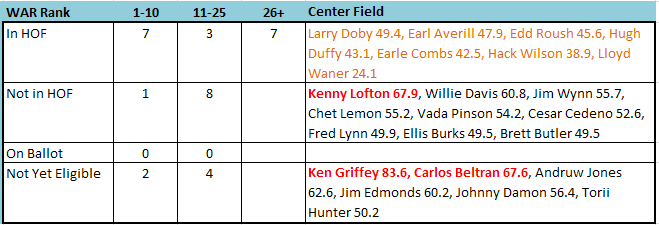Another HOF vote has come and gone, happily with better results than last year’s fiasco. But, there will be some crowded ballots in the next few years, so one can only hope that deserving players don’t drop off with unseemly haste.
There will, in fact, be so many notable players on coming ballots that I thought it could be useful to try to organize them in some structured way, if only to provide an objective way to assess the performance of voters in the coming elections.
After the jump, a handicapper’s guide to coming Hall of Fame elections.
Let’s start with a look at the current Hall of Fame members based on their all-time positional WAR ranking as of the end of the 2013 season. For position players, ranking in the WAR top 10 for a position constitutes tier I, in the top 25 tier II and outside the top 25 is tier III. The same idea for pitchers except that for tiers I, II and III, it’s the top 40, top 100 and outside the top 100. For DH, I’ve arbitrarily set a 60 WAR minimum to be considered in tier I.
So, the voters haven’t done a terrible job. 75% of the enshrined players do come from the tier I and tier II groupings. With 211 current HOF players (those elected for their play in the major leagues), a uniform distribution by position should be about 17 or 18 players at each position and about 70 pitchers. Thus, I’ve shaded the rows to indicate positions that are under-represented (green) and over-represented (red). The percentage scores that are highlighted indicate where the current distribution by tier may be a little out of whack with greater representation from a lower tier than from a higher one.
Next are the breakouts by position. I called this a handicapper’s guide, but I’m not going to be quoting any odds on future candidates (though, you are welcome to do so in your comments). For each position, I’ve grouped players into the three tiers based on their career WAR ranking. The playing position assigned to a player is the one each played more frequently than any other, but a player’s WAR rating includes his total (all positions) batting or pitching WAR. In a few cases (I’ll tell you when we come to them), I’ve added together batting and pitching WAR for players who had significant quantities of both.
For each position, the Hall of Fame members and contenders are presented as follows:
- The top line shows the number of players in the Hall of Fame by WAR-based tier. At the right are the players and WAR totals for the tier III HOFers. In assessing future candidates, players will probably need to be better than these tier III HOFers to have a decent chance of election.
- Next line are the the tier I (red) and tier II (black) players who have been snubbed, as they are either no longer on the ballot (including players dropped in the 2014 election) or have been declared ineligible. In assessing future candidates, these players may provide some guidance on borderline cases, or they may be used to assess the players who will drop from future ballots, perhaps unjustly.
- The last two lines are the players to be handicapped. First are the players currently on the ballot, by tier I (red), tier II (black) and tier III (light brown). The ballot refers to the holdovers after the 2014 election, but not including players eligible for the 2015 vote. Next are the tier I (red) and tier II (black) players who are not yet eligible for election, many of whom will be appearing on upcoming ballots.
Pitcher
So, now that we have the preliminaries out of the way, let’s start with the pitchers.
The WAR scores shown are for pitching WAR only, except for Bob Lemon, Bob Caruthers, Tony Mullane and Wes Ferrell who have their total batting and pitching WAR shown. Also, Red Ruffing’s total WAR puts him among the tier I HOF members.
I considered separating the analysis into starters and relievers but ultimately decided against that in view of the voters’ preference to only recognize relievers who were either the “pioneers” of modern relief pitching or, among later pitchers, the undisputed masters of their craft. Of course, the latter category is currently populated only by Dennis Eckersley, recognized in his time much as Mariano Rivera is today. So, now that I’ve mentioned him, yes, I fully expect Mariano will be a first ballot pick to join Eck, confirming the lofty performance standard required of future HOF relievers.
The tier I current and future candidates all look like safe bets to me. Also Roy Halladay (just outside tier I). Hard to know how voters will treat John Smoltz; will he get extra credit for excelling at both starting and relieving or will he be the odd man out now that two of his long-time staff mates have been enshrined (probably the latter, unfortunately). Pettitte, as a Yankee, stands a good chance, but he will have to wait a while. If last season was a one-off and CC returns to form, he’s clearly on a HOF path (and he may be anyway, even if last year was the beginning of the end). Hudson and Buehrle (and Jamie Moyer, just outside the top 100) will likely come up short, as consistently very good pitchers but never really great.
Catcher
Catchers are currently under-represented but it would seem that should be rectified soon. Hard to see Piazza or Pudge having any problems getting in. Joe Mauer is an interesting case; he’s on a HOF trajectory but, since he stopped winning batting titles, it seems (to me) like he doesn’t get much notice anymore. Posada will get consideration based on being a Yankee, but no such luck for Kendall.
First Base
Tough competition at first with two 70+ WAR players outside the top 10, and a bunch of 50+ WAR players outside the top 25. Albert, of course, will be a first ballot selection and Thome will make it too. Bagwell should be in already; hopefully, it won’t be too much longer. McGwire and Helton are on the bubble; I don’t think either would be a bad choice, but my gut feel is both will come up short. Same for Fred McGriff, on the wrong side of the WAR top 25.
Second Base
With Biggio barely missing induction this year, seems he will almost certainly make it in the next few tries. As the best slugging second baseman since Rajah, there should be a spot for Jeff Kent, but that may be my wishful thinking. My hunch is Utley‘s late career start will leave his counting stats a bit shy of voters’ expectations for a HOFer. Robinson Cano moves into the top 25 in 2014 and is very much on a HOF trajectory.
Third Base
The most under-represented position in the Hall will get a boost as Chipper (lock) and Beltre (almost a lock) should both make it, with matching counting milestones of 400 HR, 500 doubles, 1500 RBI and 2500 hits. The hedge on Beltre is whether voters see A-Rod more as a third baseman than as a shortstop (since he hasn’t played short in a decade, bet on the former). If A-Rod gets in first, Beltre may have a tough time making it. All of that means tough luck for Scott Rolen, joining Graig Nettles as tier I players in the “snubbed” category. Miggy is obviously on a HOF trajectory and a case could be made that he’s already there; still, he started to show his age some last season so he’ll need to follow David Ortiz’s example and slim down to get the most out of his talent and career. Perhaps too soon to offer an opinion on David Wright who moves into the top 25 in 2014.
Shortstop
Last chance for Alan Trammell will come and go as he joins teammate Lou Whitaker among the most undeserved snubs. Derek Jeter will, of course, sail in. A-Rod’s baggage will make for a tougher road, more especially if voters see him as one of several deserving third basemen (as many likely will). Omar Vizquel (outside the top 25) will get some courtesy votes but will be gone pretty quickly.
Just a note that Monte Ward is included among the tier II HOF shortstops based on his combined batting and pitching WAR, despite probably more notoriety in the latter role, with his 69 wins and 12.2 WAR both tops among teenage hurlers.
Left Field
Is 15 years long enough for voters to warm to Barry? Maybe, but he’ll have to wait a while. Raines and Manny are well clear of the best left-fielders not in the Hall but they too will likely have to wait. Hopefully, none of them drops off the ballot – that would be a shame.
Center Field
Junior is a first ballot selection and Beltran should also make it with a boost from his post-season play. And, Andruw gets in too with his home runs and defense (especially the defense). The rest are on a par with the group they will join, as the best players not in the Hall.
Right Field
Despite being by far the most over-represented position in the Hall, Larry Walker should eventually shake the Coors stigma and get in. Gary Sheffield will get a look with his 500 homers but it won’t be enough to make up for his defense (-196 WAR Fielding Runs; only Jeter has a lower total). I would have picked Ichiro as a lock a couple of years ago, but his odds are getting longer the more he hangs on as a replacement level player. Still, I’ll go with almost a lock as voters will probably rationalize that his numbers deserve to be “bumped up” because of his late start on these shores.
Designated Hitter
Kudos to the voters for not penalizing the Big Hurt for playing a majority of his career at DH. The good news is Thomas’s selection should make it easier for voters to warm to Edgar. The bad news for Martinez – as good as his numbers are, they aren’t in the same class with Thomas, where they probably need to be to get past the DH stigma. Ortiz‘s stock is a mile high right now and how can you not love a guy with a smile as big as all outdoors. Still, he’s now 38, so not much time left to get 70 more home runs for the 500 milestone that he will probably need for serious consideration.
So, that’s how I see it. Now, it’s your turn.











